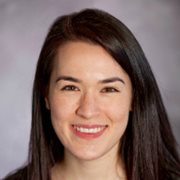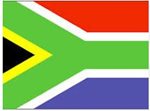Diana Jeang
 Diana is a fourth-year medical student at Emory University School of Medicine. After graduating with a Bachelor of Science in Molecular and Cellular Biology and French from Johns Hopkins University she spent a year working as a case manager in refugee resettlement. Since starting medical school Diana has remained active in the Atlanta refugee community as co-founder of the Emory Refugee Medical Alliance and Emory’s student-run refugee clinic. She is interested in the bio-psychosocial and cultural factors that influence health in international communities. Diana has been engaging in HIV research since 2008, with experience at the National Institutes of Health, Ragon Institute of MGH, MIT and Harvard, National Taiwan University, and University of KwaZulu-Natal. Through the Kean Fellowship, Diana is returning to South Africa to work with the nonprofit organization Integration of TB in Education and Care for HIV/AIDS (ITEACH) together with the University of KwaZulu-Natal and Emory University. Her research focuses on the collaboration between biomedical and traditional health practitioners in the care of people living with HIV.
Diana is a fourth-year medical student at Emory University School of Medicine. After graduating with a Bachelor of Science in Molecular and Cellular Biology and French from Johns Hopkins University she spent a year working as a case manager in refugee resettlement. Since starting medical school Diana has remained active in the Atlanta refugee community as co-founder of the Emory Refugee Medical Alliance and Emory’s student-run refugee clinic. She is interested in the bio-psychosocial and cultural factors that influence health in international communities. Diana has been engaging in HIV research since 2008, with experience at the National Institutes of Health, Ragon Institute of MGH, MIT and Harvard, National Taiwan University, and University of KwaZulu-Natal. Through the Kean Fellowship, Diana is returning to South Africa to work with the nonprofit organization Integration of TB in Education and Care for HIV/AIDS (ITEACH) together with the University of KwaZulu-Natal and Emory University. Her research focuses on the collaboration between biomedical and traditional health practitioners in the care of people living with HIV.
 Project: "Barriers to HIV Viral Load Monitoring: The Impact of a Traditional Health Practitioner Referral Intervention on HIV Treatment and Adherence"
Project: "Barriers to HIV Viral Load Monitoring: The Impact of a Traditional Health Practitioner Referral Intervention on HIV Treatment and Adherence"
6/04/2018 - 5/03/2019
South Africa
What does the Kean Fellowship mean to you?
The Kean Fellowship has given me the opportunity to do research that I have been wanting to pursue for the past five years, since I was last in South Africa. I am grateful to return to work with ITEACH, an organization that played a large role in inspiring my career goals. This fellowship is giving me the chance to interact directly with medical providers and traditional health practitioners and to learn from their experiences providing care to patients in KwaZulu-Natal.
What do you anticipate learning?
I look forward to immersing myself in Zulu culture, tradition and language. I anticipate learning about the sociocultural factors that influence HIV testing, antiretroviral therapy initiation and adherence. I am eager to learn about the practical application of Community-based Participatory Research methods, whereby the community is involved throughout the research process. I aspire to continue to engage meaningfully with diverse communities in my future research projects. This experience is helping me to develop fundamental skills not only in research but also in communications and intercultural competency that I will apply throughout my career in medicine.
What interests you about tropical medicine and what problems are you interested in solving?
My interest in tropical medicine was sparked by my interest in global medicine and in HIV. Knowledge of tropical medicine is essential to providing care and conducting meaningful research in the global setting. I am drawn to the study of HIV because of the sociocultural and psychological factors that influence its perception and management. An understanding of the context of HIV is essential to combating the disease. Moreover, the context of HIV varies in different regions of the world. I am interested in improving HIV care by increasing understanding and collaboration between the disparate groups of people invested in this disease. Patients, healthcare workers, alternative and traditional medicine practitioners, community leaders, public health officials and social scientists all approach this topic with different preconceptions. I believe that improving interdisciplinary collaboration and community involvement is key to effectively addressing the varied factors that impact HIV care.